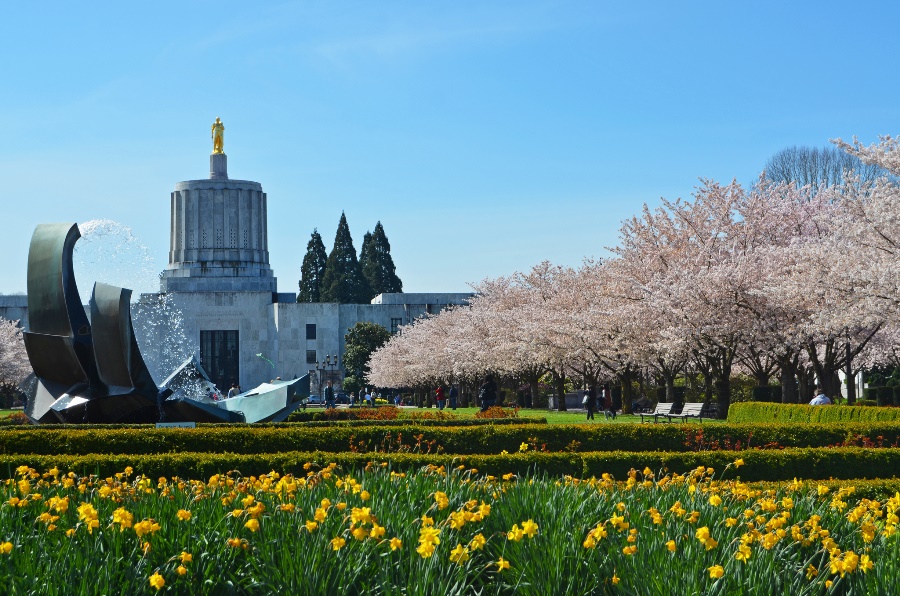It was a dark day for democracy when 11 Oregon senators successfully blocked a major climate and clean energy bill by leaving the state to prevent a quorum. But, in other ways the Oregon lawmaking session was a smashing success for democracy. Here are four bills that will make elections more fair and meaningful, and a bonus success that suggests democracy is working.
1. National Popular Vote Interstate Compact
Oregon’s legislature voted to become the 16th state to join the National Popular Vote Interstate Compact—a binding agreement among participating states to give their electoral college votes to the candidate who wins the national popular vote. The compact takes effect when the agreeing states have a majority of electoral college votes. With Oregon’s adoption, the compact now has 196 electoral votes behind it and it needs a total of 270 electoral votes to take effect. If states with 74 more electoral college votes sign on, in the next election, the presidential candidate who wins the most votes will win the election.
2. Oregon Voting Rights Act
Many Oregon school districts have a majority of students of color but are often still led by mostly white school boards. As a first step toward addressing this disparity, lawmakers passed the Oregon Voting Rights Act, HB 3310, with overwhelming bipartisan support.
The measure requires that people of color have “an equal opportunity to elect candidates of their choice” without having their votes diluted. A school board that recognizes an imbalance can authorize a chance to alter its electoral method which opens the door for better election and voting systems, such as multi-winner districts with ranked-choice or cumulative voting. An individual may bring a lawsuit against a district that does not allow for equal opportunity at representation.
3. Campaign Contribution Limits
Voters will see an initiative on the 2020 ballot to amend the state constitution to allow campaign contribution limits. Oregon is one of only five states with no limit on campaign contributions. If a majority of Oregon voters approve the 2020 initiative, lawmakers at city, county, and state levels could set campaign contribution limits, require disclosure of contributions, and require political advertisements to say who paid for them.
It could also put stricter limits on the maximum contributions for legislative and other statewide candidates—no more than $100 to the former and no more than $500 to the latter. (There is a chance lawmakers would loosen those figures a little bit. Read the full article for all the details.)
4. Postage-Paid Ballots
Voting at home is pretty much a smashing success for voter participation. But now that Oregon lawmakers passed Senate Bill 861, the state will provide pre-paid postage envelopes with mailed ballots and turnout could get even better. The bill will take effect in January 2020. The first election it applies to could be a special election that month if opponents to the new $1 billion-a-year business tax for education are successful in gathering enough signatures to force a vote on the measure.
Bonus: ending daylight savings clock changes
Why are clock changes a “democracy reform” issue? Because stopping twice-annual time-changes should be just the sort of thing elected representatives can fix. Voters don’t like time changes, time changes kill people from heart attacks and traffic collisions, there is no benefit to changing the clocks and benefits to keeping daylight savings year-round, and, notably, there are no deep-pocketed special interests lobbying legislators and filling their campaign chests to get them to keep changing the clocks twice a year. Every session that bills to stop the time-changing madness are introduced but fail, my despair for democracy deepens. And my hope that lawmakers can act on climate change or other issues that actually have moneyed opposition shrinks a little.
But this year is a beacon of light in the darkness.
West Coast states and provinces gave me hope. Oregon and Washington passed bills to stay on Daylight Savings Time year-round. California passed a ballot measure and a bill–unanimously through the House and with bipartisan support in the Senate. The British Columbian Premier has said if the three states do it, BC will, too.
Now it’s up to Congress. Federal law allows states to change their clocks twice a year or stay on Standard Time all year (as Arizona and Hawaii do), but states can’t stay on Daylight Savings year-round. So Congress must change the law for the Western states’ laws to take effect. Florida Senator Marco Rubio has introduced a bill to move the whole country to permanent Daylight Savings (Florida has already votes to stay on Daylight Savings year-round).
Meanwhile, Europe has already voted to end time changes. By 2020, each European Union member can decide for itself whether to stay on daylight saving time or on standard time year-round. In 2021, the change will go into effect and European countries will stop changing their clocks.
Oregon’s split personality
Oregon is both very liberal and very conservative. This polarity led to a dramatic political showdown that imperiled democracy through lawmakers disregarding their duties and militias threatening violence. At the same time, the state passed a slew of laws that could make the gears of democracy turn more smoothly in the future. Looking at the bills that lawmakers passed in Salem compared to, say, Florida, (lawmakers there gutted an overwhelmingly supported ballot initiative to grant ex-felons the right to vote again) show us Oregon is doing a few things right.











Parker Friedland
1. National Popular Vote Interstate Compact
This isn’t a win for democracy if we want to be able to move past FPTP presidential elections. The NPVIC doesn’t end FPTP presidential elections, it just makes the FPTP process more democratic but the catch is it further cements FPTP voting into our presidential elections. The electoral college at-least gives individual states the ability to allow voters to elect their presidential delegates via some voting method other then FPTP. The NPVIC on the other had just tells all the states that have signed on to give their delegates to the popular vote winner among the states that signed it without defining what the ambiguous term popular vote even means if some states use voting methods other then FPTP.
Once the compact is enacted, the only way to resolve this ambiguity would be to convince all the states in the compact to define some fair way (if there is one) to define who the popular vote winner is when not all states are using FPTP. This significantly raises the barrier to entry for alternative methods to be used at the presidential level because instead of needing to get just one state on board, you now need a number of states with an electoral college point total of 270. This makes reforming the presidential system VIRTUALLY IMPOSSIBLE. Ending the EC is something that needs to happen after a number of states adopt alternative voting methods for presidential elections or else we may get stuck with FPTP.